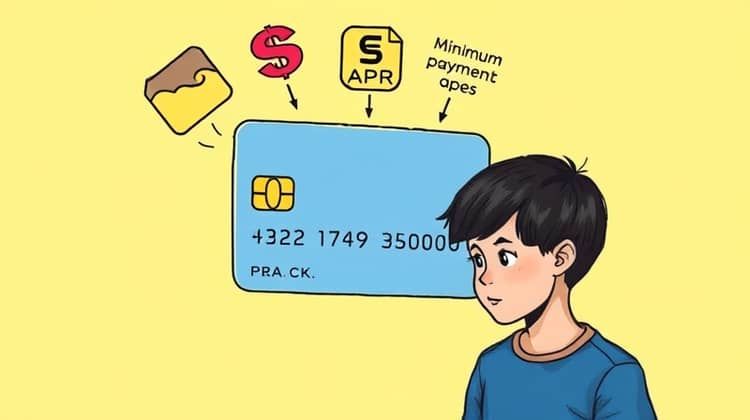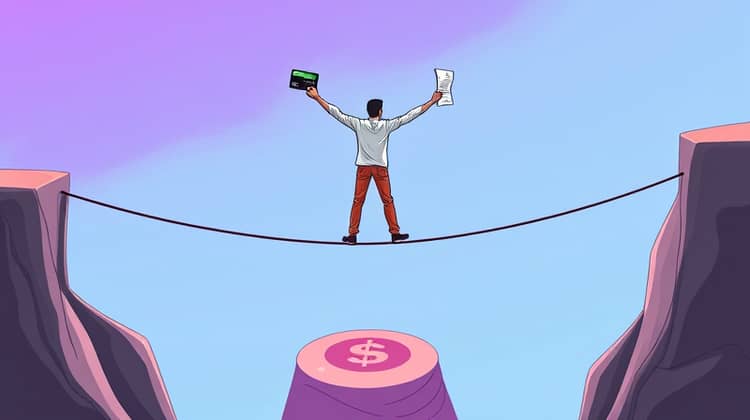Navigating the financial landscape during your college years can be a daunting task, especially when it comes to managing credit cards. While credit cards can provide a convenient means of payment, they can also lead to the pitfall of debt if not handled properly. This blog post will outline five essential tips to help you avoid falling into credit card debt while pursuing your education. By following these guidelines, you can build a solid financial foundation that will serve you well in the future.
Understanding the fundamentals of credit cards is the first step towards responsible usage. With the right knowledge and a proactive approach to budgeting, you can indulge yourself occasionally without jeopardizing your financial health. Remember, the goal here is to empower you to make informed decisions and maintain control over your finances throughout your college career.
1. Understand Credit Card Basics

Before diving into credit card usage, it's crucial to understand what a credit card is and how it works. A credit card allows you to borrow money up to a certain limit to make purchases, which you will need to pay back later, usually within a month, to avoid interest fees. Knowing the terms and the potential ramifications of misusing credit is vital, especially for students who may be using a credit card for the first time.
It's important to familiarize yourself with terms such as APR (annual percentage rate), minimum payments, and grace periods. An APR reflects the interest you will incur if you carry a balance that isn't paid off each month. Failing to comprehend these concepts can lead to financial mistakes, which can haunt you for years. It is in your best interest to be well-educated about credit cards before making your first swipe.
- Pay attention to the credit limit, as exceeding it can result in penalties or drops in credit score.
- Review your credit card statements monthly to monitor spending and identify any unauthorized transactions.
- Take advantage of educational resources offered by credit card companies to understand fees and terms better.
Once you grasp the essentials of credit cards, you can make wiser choices about using them. This knowledge will serve as your foundation, allowing you to navigate the complexities of credit with confidence. Remember, credit cards are tools, and like any tool, they can either build or break your financial stability depending on how you use them.
The importance of understanding the basics cannot be overstated. The misuse of credit cards during college can lead to accidental debt and financial stress, which can distract students from their studies and college experiences. Take the time to educate yourself on credit card usage before you start charging purchases.
2. Create a Budget and Stick to It

Budgeting is a fundamental skill that every college student should develop. By creating a budget, you can plan your expenses based on your income and existing financial obligations. This practice ensures that you do not overspend and helps you prioritize your essential needs over wants, setting you up for a stable financial future.
When you stick to a budget, you become more aware of your spending habits and can identify areas where you may be overspending. It's beneficial to track your expenses meticulously, so you can adjust your budget accordingly. The discipline gained from this practice will aid you in managing credit card usage more effectively, ultimately reducing the likelihood of incurring debt.
3. Limit the Number of Credit Cards

While having multiple credit cards may seem appealing due to various perks and rewards, it can lead to increased temptation and, consequently, debt. The more credit cards you have, the more difficult it becomes to manage your spending. Therefore, it’s wise to limit yourself to just one or two credit cards during your college years.
Having fewer credit cards means you can focus on managing them effectively without feeling overwhelmed. Not to mention, each time you apply for a credit card, a hard inquiry is made on your credit report, which can impact your credit score. Keeping your credit cards limited will allow you to build a stronger credit history without overexposing yourself to financial risks.
- Choose a card with no annual fee and lower interest rates.
- Select a card that offers rewards aligned with your spending habits, such as cash back for groceries or gas.
- Avoid signing up for multiple cards that could lead to confusion and unintentional overspending.
Limiting your number of credit cards gives you a clearer picture of your financial responsibilities. You can stay organized and keep track of balances and due dates more easily with just one or two cards. In doing so, you reduce the risk of missing payments that could lead to late fees and damage your credit score.
After you’ve decided on your credit cards, commit to using them responsibly. Subscribe to alerts or reminders for upcoming payments to further protect yourself from accumulating debt. The key is to treat your credit card as a tool to build good credit rather than a crutch for impulse purchases.
4. Pay Your Balance in Full Each Month

To maintain a healthy relationship with credit cards, make it a habit to pay your balance off in full each month. Carrying a balance leads to accumulating interest, which can spiral out of control, especially for students on limited budgets. Not to mention, it can significantly impact your credit score negatively in the long term.
Paying off your balance in full demonstrates to creditors that you are financially responsible and capable of managing credit. This practice not only protects your credit score but can also save you money in the long run, as you avoid interest payments that can compound if left unpaid.
- Set reminders a few days before your due date to ensure you never miss a payment.
- Consider automating your payments to make the process easier.
- Always review your statement for accuracy before making a payment.
In the event that you cannot pay your balance in full surprisingly, avoid the mistake of only making the minimum payment. Minimum payments can lead to high-interest charges and extend the time it takes to pay off your debt, making it harder for you to regain control of your financial health. It's best to pay as much as you can towards your balance whenever possible.
Developing the discipline to pay your credit card in full not only helps prevent debt but promotes healthier spending habits. This small change can lead to greater financial security and peace of mind throughout your college years and beyond.
Remember, managing credit is a long-term goal. The sooner you establish a good payment routine, the better off you will be as a graduate entering the world of loans, mortgages, and other financial obligations.
5. Be Wary of High-Interest Rates and Fees

One of the biggest pitfalls for college students with credit cards is falling victim to high-interest rates and hidden fees. Some credit cards advertise low introductory rates but later switch to significantly higher rates once that period expires. It's crucial to read the fine print and understand what you're signing up for before obtaining a credit card.
Additionally, be aware of any potential fees for late payments, annual fees, or cash advances. These fees can add up quickly and lead you into the very debt you're trying to avoid, making it essential to research the terms before committing to a particular card.
- Review your options and compare different credit card offers before applying.
- Choose a card with a manageable interest rate that fits your budget.
- Stay alert for promotional periods that can benefit your spending needs but have reasonable regular rates afterward.
By being wary of high-interest rates and fees, you can save yourself a considerable amount of money over time. Even a small percentage can have a big impact on your overall debt, so take the time to understand your credit obligations thoroughly. Avoiding costly mistakes now can prevent future headaches and financial strain.
Financial responsibility is key in maintaining good credit health. Always keep an eye on your spending, and remember that a credit card should supplement your spending habits, not dictate them. With careful management, you can build a bright financial future as you pursue your education.
Conclusion

Avoiding credit card debt during your college years is not only possible but essential for your financial future. By understanding the basics of credit cards, creating a budget, limiting the number of cards you possess, paying off your balance every month, and being mindful of the potential pitfalls of high-interest rates and fees, you can take control of your finances effectively. By implementing these tips, you empower yourself to enjoy your college experience without the added stress of overwhelming debt.
Practicing healthy financial habits while in college will pave the way for sound financial decisions in later years. Managing your credit responsibly now can lead to better loan rates on major purchases like cars and homes in the future. Maintaining a good credit score will open doors and give you more opportunities.
The tips shared in this article are simple yet significant steps needed to shape your financial habits and ensure you thrive during and after college. You'll find that commitment to these practices not only prevents debt but also allows you to focus on your studies and enjoy the vibrant college experience.
Empowering yourself with financial knowledge today will undoubtedly make a difference tomorrow. The road to financial security begins with aware decisions and intentional habits. Embrace the journey, and may your experiences be rewarding and debt-free.














